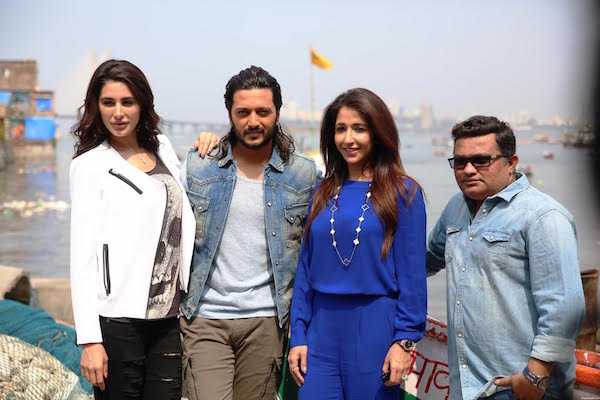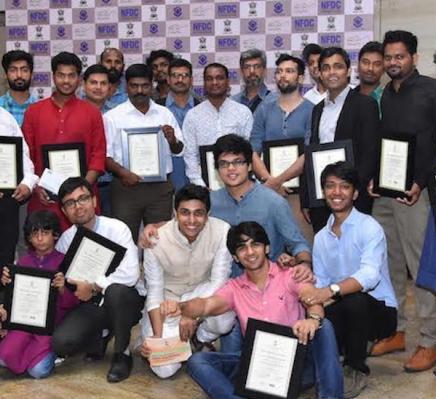Street music is not respected like other forms of music: Ravi Jadhav
With movies like Timepass and Balak Palak, Ravi Jadhav has become one of the most sought after directors in Marathi cinema. Now, he is all set to venture into Bollywood with Banjo, his first Hindi movie. Jadhav through his new movie explores the street music of Mumbai. The music is given by Vishal–Shekhar, who according to Jadhav are the real heroes of the movie.
Catch the man of the hour in a candid conversation with Pandolin where he passionately talks about street music and other art forms that are yet to be explored by the industry. From the conception of the movie to the cast and music, Jadhav has some interesting insights to share.

Director Ravi Jadhav (Right) with actor Riteish Deshmukh who stars in Banjo
What was the point of conception of Banjo? Was there a specific reason behind centering the story around a musical instrument?
This movie is a metaphor, which stands for all the art forms that need a stage. Banjo is about street music and is not limited only to Maharashtra or Marathi. If you research, you will get to know that each state has its own street music. But this kind of music has never got a stage. If you go to international markets, they have hip-hop or rap or even rock music which have all originated from street music. But someone gave them a stage to perform and now these have become independent genres and an important part of the music industry. In India, we are so lucky that we have so many kinds of music; the streets have beautiful music that we dance to, but this music has not been respected like other forms of music. And that pinched me.
I was in a wedding once and there were kids who were playing music and people were dancing to it. Money was being thrown and the children were picking that money with their mouth; that is where my problem started. They are also musicians and yet we don’t treat them with the respect that they deserve. Street musicians play only to earn and not for themselves. After that (incident), I started researching on the subject.
The story of Banjo is about the journey from the stomach to the heart, though the distance is very small, but covering that takes years. There are so many art forms that don’t get a stage, there are various dance forms or a particular form of painting that has never been explored. So there are all these small things and stories that we have tried to say through Banjo.
What was the thought process behind casting Riteish Deshmukh and Nargis Fakhri?
When I met Nargis (Fakhri) for the first time, I told her that she was the one for the film. Nargis plays the character of Christina, who comes from New York to Mumbai and doesn’t know anything about the city or the language. She doesn’t know how to dress according to the city. And Nargis could identify with all of this. So we didn’t have to prepare much as she is playing herself in the film and that is why she was very comfortable. Adding to this was the way she talks in Hindi, which was a big advantage for the film.
As for Riteish Deshmukh, he was my first choice. Riteish and I produced Balak Palak together, and we have been friends for a long time now. Even when we were writing the film, I had only Riteish in mind for the central character. I told him that we are working on a movie called Banjo and that I would be glad if he did it. He liked the concept, so he came on board.
Even when we were writing the film, I had only Riteish in mind for the central character
Since this film has music at its core, what were your requirements from the composers? How did you choose the composers for the film?
I am very happy with the music. Firstly, it was very difficult because this is street music; it is a kind of music that is very loud and to record live along with creating the same impact that one would experience on the streets, and to deliver that in the theater was not easy. There are very few recording studios in Mumbai that can do that. Vishal (Dadlani) and Shekhar (Ravjiani) have done a brilliant job with the music. Since this is a musical film, Vishal–Shekhar are the real heroes of the film. Vishal comes from a rock background while Shekhar comes from a classical background and together they create perfect music.
READ: RITEISH DESHMUKH TURNS LYRICIST FOR BANJO

(L-R) Nargis Fakhri, Riteish Deshmukh, Producer Krishika Lulla and Director Ravi Jadhav
How and why did this transition from Marathi to Hindi cinema happened? Do you think this is the right time to enter Bollywood?
I actually think that it is the right time to enter Bollywood because in the past few years there have been some significant changes in the industry. Though glamour and entertainment is important, today even the subject or the story of the film is given equal importance. Big stars like Akshay Kumar, Aamir Khan and Salman Khan are now doing subject – oriented films and that is why I think that this was the right time to enter Hindi cinema.
Coming to the movie, when it was in the writing stage, we understood that we are communicating the idea to people across India and not just a limited audience, and that is one of the reasons that the movie is in Hindi.
Though glamour and entertainment is important, today even the subject or the story of the film is given equal importance
Are there any differentiating points in the way Marathi and Hindi cinema are created?
I think the process is almost the same. The only major differentiating point is the target audience. In Marathi films, it is primarily the Marathi audience while with Hindi cinema, it is the whole of India. Even though a Marathi film is travelling to say Cannes or a Toronto film festival, it is made for the Marathi audience.
The second point that is different is the budget. Some of my previous films had a budget of 3 crore and in Bollywood you can spend that much just on a song. There is a budget to market the movie, which is constrained in the Marathi industry. Besides these two points, the process of filmmaking is the same as far as I am concerned.



